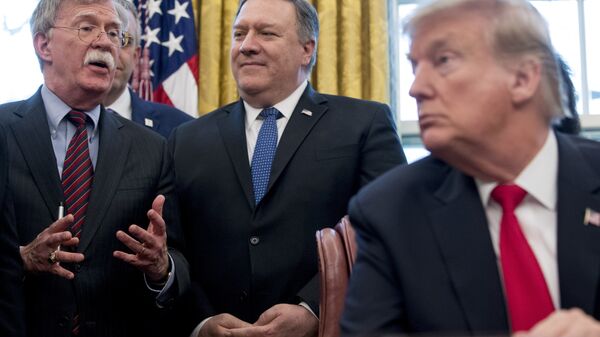US President Donald Trump is currently engaged in a debate with National Security Adviser John Bolton over how to deal with the Iran issue, a senior White House official has told CNN.
The official reportedly said that in the Iran debate between Trump and Bolton, officials such as Pompeo, Vice President Mike Pence and incoming acting Secretary of Defense Mark Esper play the role of “swing votes”.
Donald Trump had scaled down his rhetoric, saying Iran's attack on the US spy drone was probably an unintentional “mistake,” as he sought to defuse tensions with Iran on Thursday morning after Tehran downed a US drone near the Persian Gulf.
The President reminded reporters in the Oval Office that “I want to get out of these endless wars. I campaign on that.”
His tempered remarks were in sharp contrast to positions voiced by Secretary of State Mike Pompeo and particularly harsh warnings of John Bolton and other senior security aides.
CNN learned from a senior diplomatic source that Secretary of State Mike Pompeo acts as “a triangulator” between Donald Trump and John Bolton on the Iran issue.
“From what we've seen, Pompeo has made an effort to be a sort of triangulator between Bolton's well-known views and the President -- somewhere in between,” the diplomatic source said.
On Sunday, Mike Pompeo said the US was “considering a full range of options” regarding rising tensions with Iran, including military options, but emphasised that President Donald Trump had said that he does not want to go to war.
In a CBS interview, when asked if a military response was included in that set of actions, Pompeo responded, “Of course”.
Pompeo and Bolton have reportedly played a crucial behind-the-scenes role in formulating the US response to Tehran, according to US officials, with Pompeo and other senior officials pressing ahead with the argument that Trump has the legal authority to take military action against Iran without seeking approval from Congress.
Tensions flared sharply between the US and Iran in the wake of the downing of a US Global Hawk spy drone by the Islamic Revolutionary Guard Corps that, according to Tehran, was in violation of Iran airspace, specifically Hormozgan province on the nation's southern coast.
US President Donald Trump initially approved a military operation, stating Iran had made "a very big mistake", but subsequently pulled back from launching it on Thursday night, as he later suggested to reporters that he doubted the drone downing was intentional, The New York Times reported.
According to the report, military and diplomatic officials were in anticipation of a strike order as late as 7 p.m. (23:00 GMT) Thursday as heated debates involving Trump's top national security officials and leaders from Congress took place at the White House.
Tehran stated on Thursday that the country had downed the US drone to send a "clear message" to Washington that it is “fully prepared to defend Iran”.
Iranian Foreign Minister Mohammad Javad Zarif tweeted a map showing the coordinates of the downed drone, noting Iran had retrieved “sections” of it in Iranian territorial waters, as he sought to disprove US claims its drone was downed by the Iranian army in international airspace.
At 00:14 US drone took off from UAE in stealth mode & violated Iranian airspace. It was targeted at 04:05 at the coordinates (25°59'43"N 57°02'25"E) near Kouh-e Mobarak.
— Javad Zarif (@JZarif) June 20, 2019
We've retrieved sections of the US military drone in OUR territorial waters where it was shot down. pic.twitter.com/pJ34Tysmsg
The volatile incident followed a spate of recent attacks on oil tankers in the Persian Gulf region that the United States blamed on Iran, with Tehran rejecting all allegations.
Relations between Washington and Tehran have been spiralling since May 2018, when US President Donald Trump’s administration scrapped the 2015 nuclear deal, under the pretext that it had fallen short of curbing Iran's ballistic missile programme.




